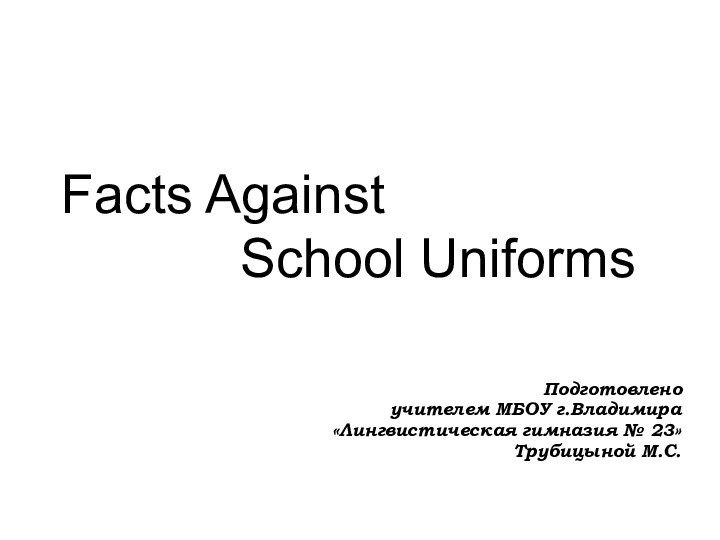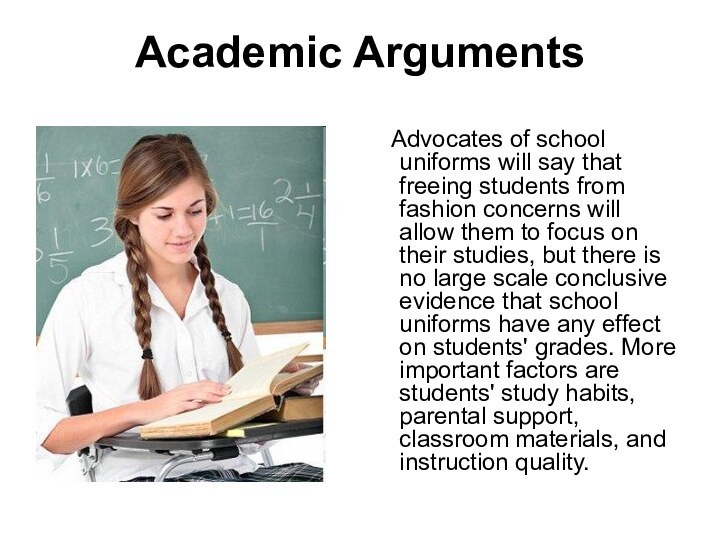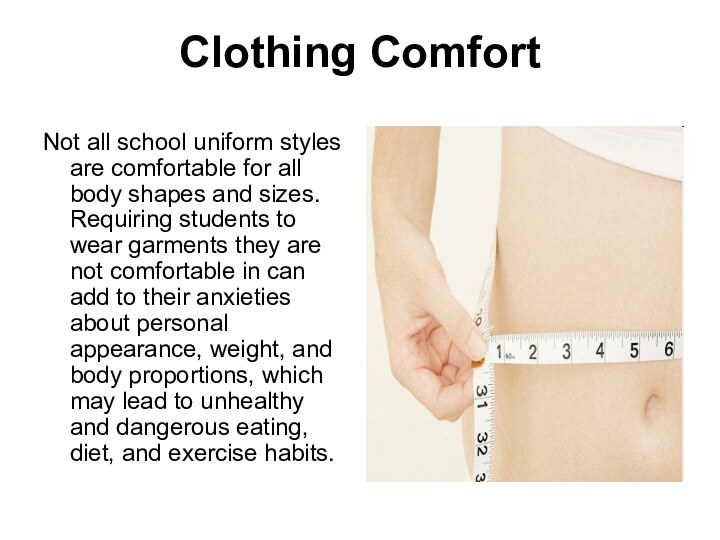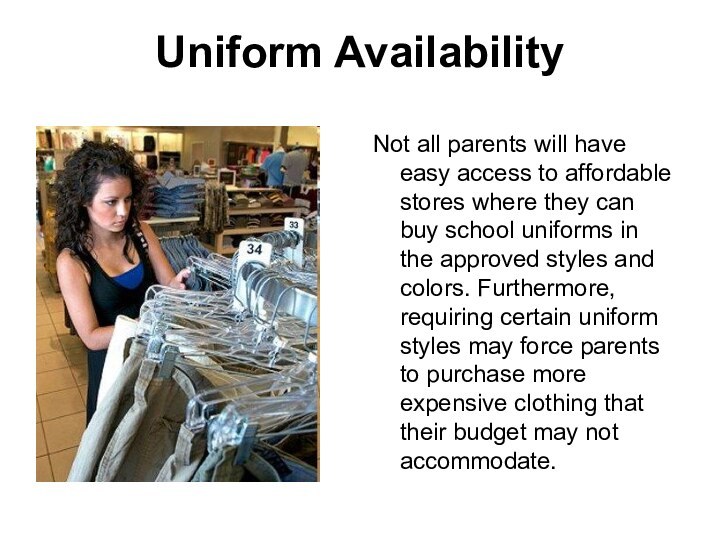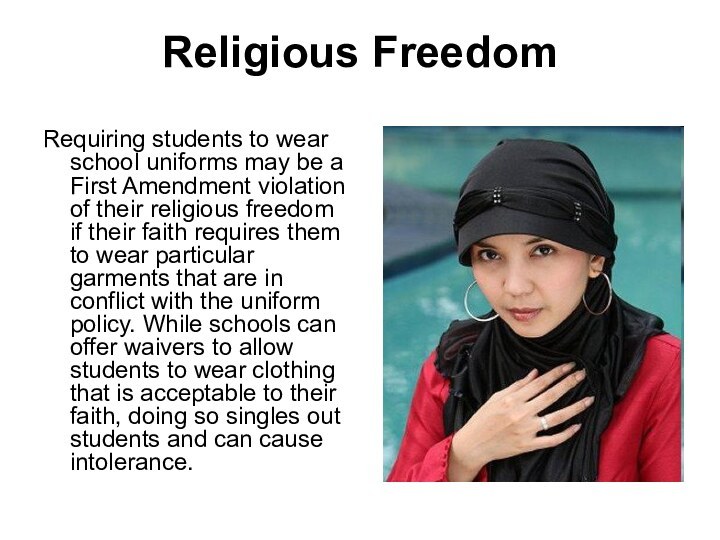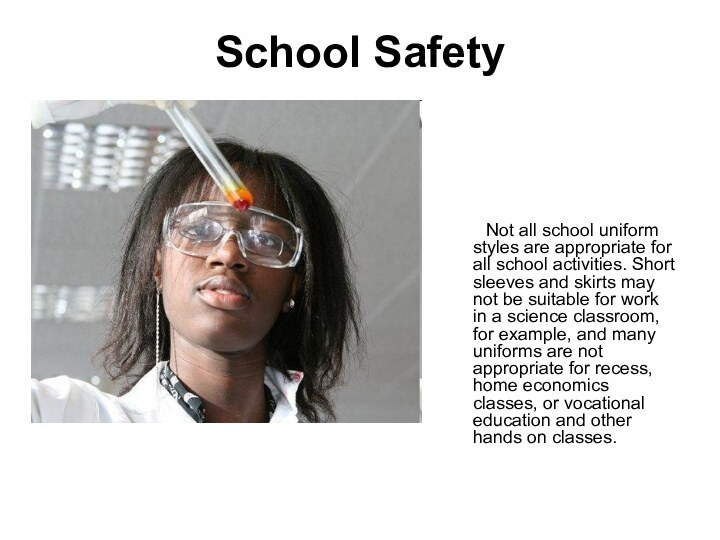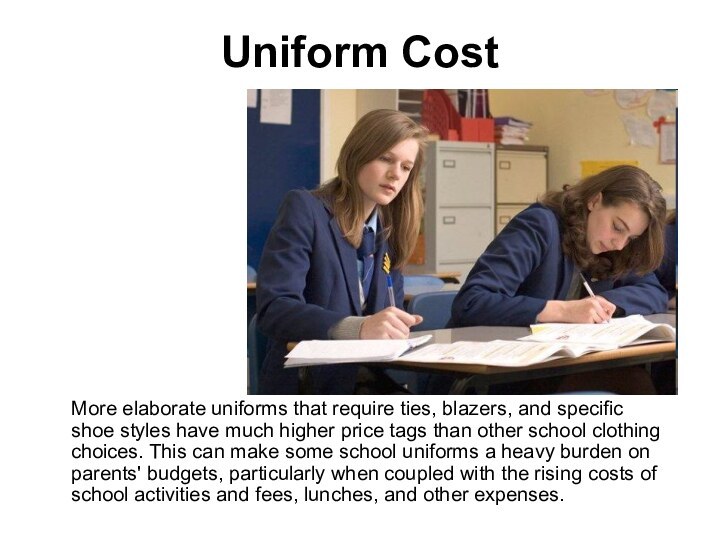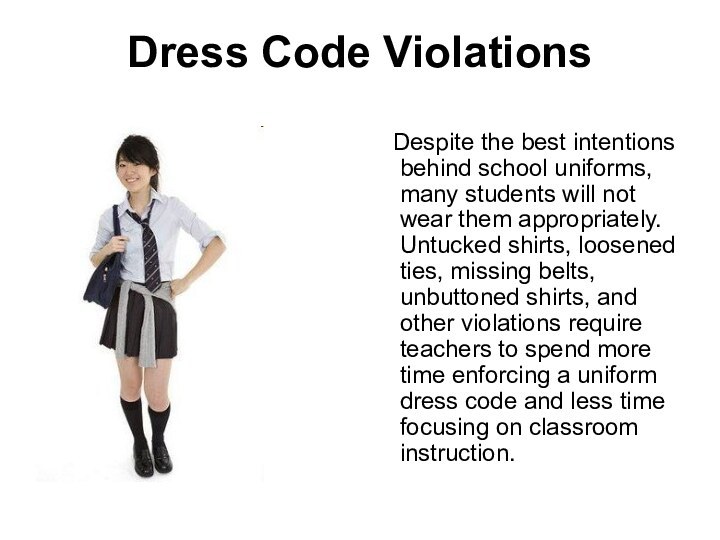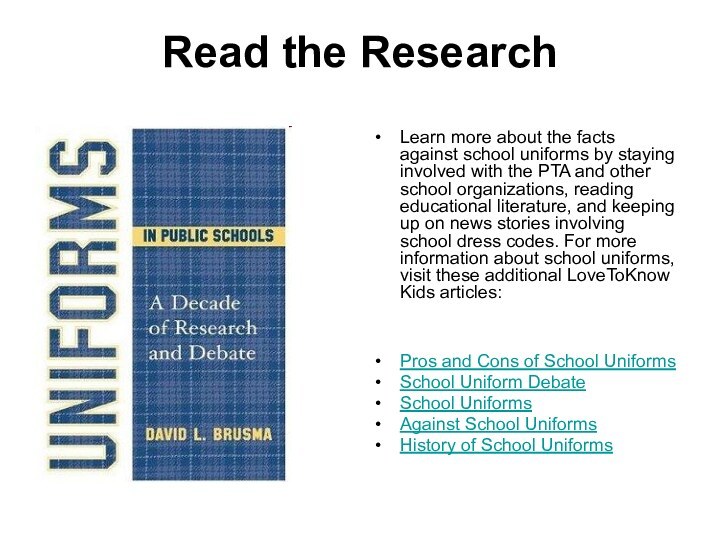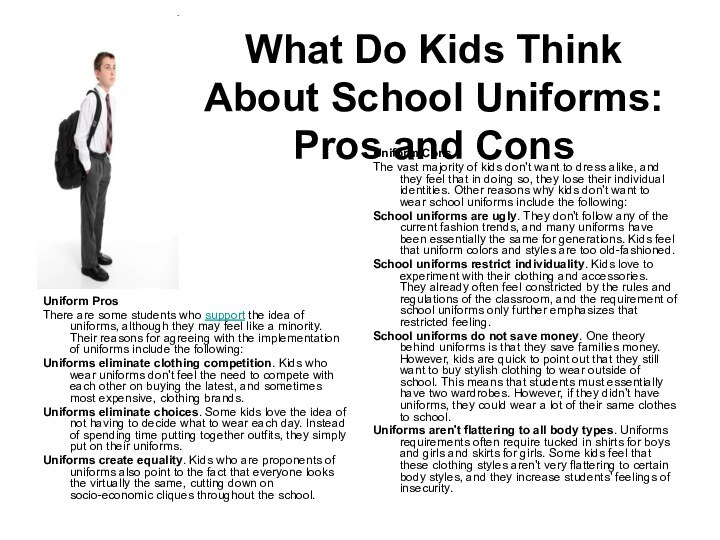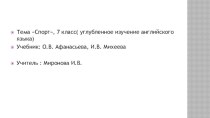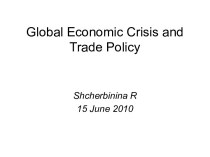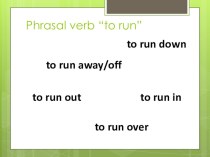Слайд 2
Restricting Individuality
The school uniform debate has been a
hot one for years, and while both sides of
the debate have many valid points, there are several facts against school uniforms that must be considered when discussing this type of dress code policy.
One of the biggest arguments students make against school uniforms is that being required to wear identical clothes restricts their individuality and right to free expression, which can in turn add more emotional stress to an already turbulent adolescence.
Слайд 3
Academic Arguments
Advocates of school uniforms will
say that freeing students from fashion concerns will allow
them to focus on their studies, but there is no large scale conclusive evidence that school uniforms have any effect on students' grades. More important factors are students' study habits, parental support, classroom materials, and instruction quality.
Слайд 4
Inappropriate Dress
Some school uniform designs are
inappropriate for younger students who will participate in recess
or physical education without changing clothes. Skirts and dress slacks are inappropriate for gym activities, and light colors such as tan, white, and sky blue stain easily, which can add an extra burden on parents to buy more uniforms or pay for extra cleaning.
Слайд 5
Clothing Comfort
Not all school uniform styles are comfortable
for all body shapes and sizes. Requiring students to
wear garments they are not comfortable in can add to their anxieties about personal appearance, weight, and body proportions, which may lead to unhealthy and dangerous eating, diet, and exercise habits.
Слайд 6
Uniform Availability
Not all parents will have easy access
to affordable stores where they can buy school uniforms
in the approved styles and colors. Furthermore, requiring certain uniform styles may force parents to purchase more expensive clothing that their budget may not accommodate.
Слайд 7
Religious Freedom
Requiring students to wear school uniforms may
be a First Amendment violation of their religious freedom
if their faith requires them to wear particular garments that are in conflict with the uniform policy. While schools can offer waivers to allow students to wear clothing that is acceptable to their faith, doing so singles out students and can cause intolerance.
Слайд 8
School Safety
Not all school
uniform styles are appropriate for all school activities. Short
sleeves and skirts may not be suitable for work in a science classroom, for example, and many uniforms are not appropriate for recess, home economics classes, or vocational education and other hands on classes.
Слайд 9
Uniform Cost
More elaborate uniforms that
require ties, blazers, and specific shoe styles have much
higher price tags than other school clothing choices. This can make some school uniforms a heavy burden on parents' budgets, particularly when coupled with the rising costs of school activities and fees, lunches, and other expenses.
Слайд 10
Dress Code Violations
Despite the best intentions
behind school uniforms, many students will not wear them
appropriately. Untucked shirts, loosened ties, missing belts, unbuttoned shirts, and other violations require teachers to spend more time enforcing a uniform dress code and less time focusing on classroom instruction.
Слайд 11
Read the Research
Learn more about the facts against
school uniforms by staying involved with the PTA and
other school organizations, reading educational literature, and keeping up on news stories involving school dress codes. For more information about school uniforms, visit these additional LoveToKnow Kids articles:
Pros and Cons of School Uniforms
School Uniform Debate
School Uniforms
Against School Uniforms
History of School Uniforms
Слайд 12
School Uniform Debate By Misty Karam
In the ongoing
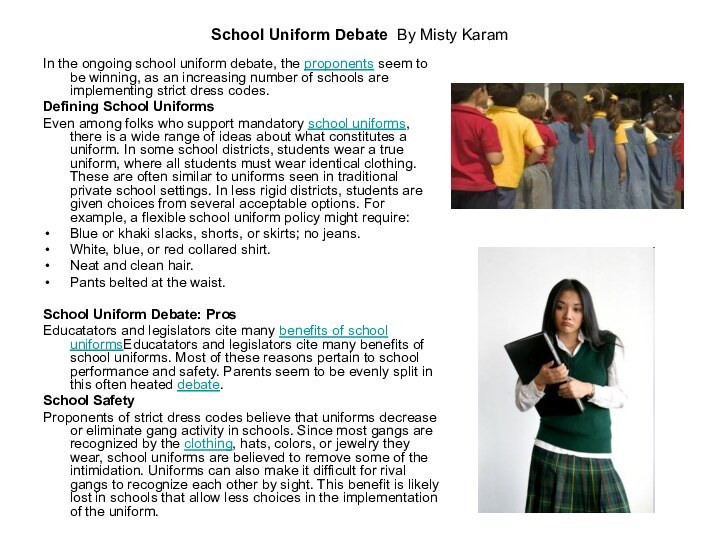
school uniform debate, the proponents seem to be winning,
as an increasing number of schools are implementing strict dress codes.
Defining School Uniforms
Even among folks who support mandatory school uniforms, there is a wide range of ideas about what constitutes a uniform. In some school districts, students wear a true uniform, where all students must wear identical clothing. These are often similar to uniforms seen in traditional private school settings. In less rigid districts, students are given choices from several acceptable options. For example, a flexible school uniform policy might require:
Blue or khaki slacks, shorts, or skirts; no jeans.
White, blue, or red collared shirt.
Neat and clean hair.
Pants belted at the waist.
School Uniform Debate: Pros
Educatators and legislators cite many benefits of school uniformsEducatators and legislators cite many benefits of school uniforms. Most of these reasons pertain to school performance and safety. Parents seem to be evenly split in this often heated debate.
School Safety
Proponents of strict dress codes believe that uniforms decrease or eliminate gang activity in schools. Since most gangs are recognized by the clothing, hats, colors, or jewelry they wear, school uniforms are believed to remove some of the intimidation. Uniforms can also make it difficult for rival gangs to recognize each other by sight. This benefit is likely lost in schools that allow less choices in the implementation of the uniform.
Слайд 13
Learning Environment
A school uniform is also said
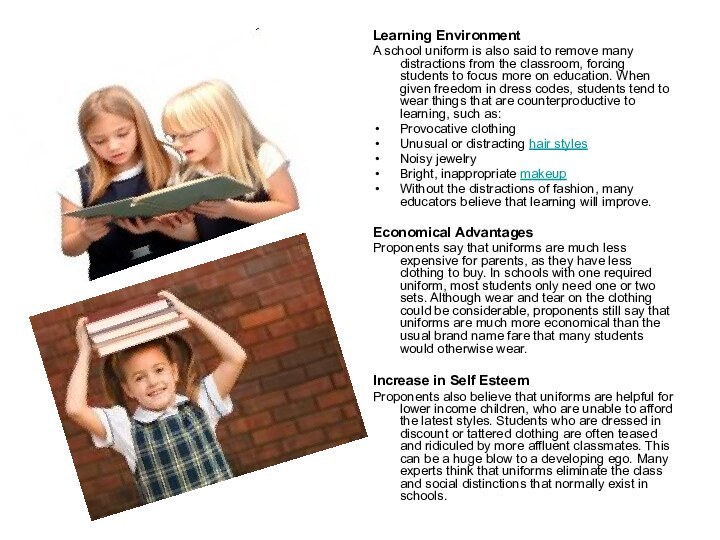
to remove many distractions from the classroom, forcing students
to focus more on education. When given freedom in dress codes, students tend to wear things that are counterproductive to learning, such as:
Provocative clothing
Unusual or distracting hair styles
Noisy jewelry
Bright, inappropriate makeup
Without the distractions of fashion, many educators believe that learning will improve.
Economical Advantages
Proponents say that uniforms are much less expensive for parents, as they have less clothing to buy. In schools with one required uniform, most students only need one or two sets. Although wear and tear on the clothing could be considerable, proponents still say that uniforms are much more economical than the usual brand name fare that many students would otherwise wear.
Increase in Self Esteem
Proponents also believe that uniforms are helpful for lower income children, who are unable to afford the latest styles. Students who are dressed in discount or tattered clothing are often teased and ridiculed by more affluent classmates. This can be a huge blow to a developing ego. Many experts think that uniforms eliminate the class and social distinctions that normally exist in schools.
